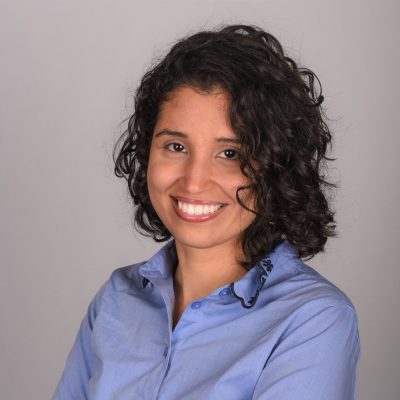Student Spotlight: Mariely Medina

May 11, 2020
Mariely Medina is a doctoral candidate in food science and technology from Cayey, Puerto Rico. After earning a B.S. and M.S. from the University of Puerto Rico at Mayaguez, she chose to pursue further study at Cornell due to the learning possibilities, flexibility, and community in the field of food science.
What is your area of research, and why is it important?
I’m working on an innovative assay to improve the detection of a group of bacteria used as an indicator of fecal contamination on drinking water, as required by the Environmental Protection Agency (EPA).
The main goal of my research is to develop an improved method to detect these bacteria indicators, reducing the rate of waterborne enteric illnesses. Current EPA approved methods take 18 hours to days, require a lab, and produce a high rate of false-negatives. In its final form, an individual will open a kit, follow instructions, and get accurate results in less than eight hours without the need for a lab or expensive equipment.
What are the more significant implications of this research?
The implications include the possibility of improving and modernizing current methods to determine drinking-water safety and prevent illnesses. Also, our approach allows for the detection of very small amounts of bacteria in water in a short period; this can be modified to detect pathogenic microorganisms in other matrixes such as food and blood.
What inspired you to choose this field of study?
After completing an M.S. specializing in molecular environmental microbiology, I started working as a lecturer. During those days, I discovered that food microbiology was my favorite subject to teach. Designing and putting into practice hands-on activities for my students was the highlight of my working week. At Cornell, I developed a keen interest in food and water safety, as well as technology development and public policy. My research has all of these components.
What have you gained by participating in the NextGen Professors Program?
When the goal looks as far as completing a Ph.D., it is necessary to celebrate and acknowledge the small accomplishments. The NextGen Professors Program helped me see the goal as a chain made out of small pieces, not a straight line. In every meeting, we gain knowledge from other people’s experiences on career paths and we are encouraged to reevaluate ourselves in a kind manner.
How has this program helped work toward your professional goals?
NextGen Professors and other professional development programs at Cornell helped me create a professional development plan early. It has been a great tool to advance my goals.
The Ph.D. program, as a whole, allowed me to experience research from a multidisciplinary point of view. It adjusts my perception of science in the advancement of society. My public speaking and scientific communication skills were transformed during my time as a member of the Food Micro Minutes Podcast team. All necessary skills to work as a scientist and academic anywhere.
What are your hobbies or interests outside of your research or scholarship?
I found that walking and taking a picture of nature is a very relaxing activity. My dog, Cali, likes it too. Even when it’s hard to find the right ingredients in Ithaca, sometimes I try to replicate family recipes and love when they turn out as good as I remembered.
Why did you choose Cornell to pursue your degree?
At first, I was impressed by the broad array of learning possibilities and flexibility that the food science field offered by itself. Then I met the close and caring community within the department and made the decision. The option of a wide array of minors, professional development programs, and certifications also weighted my decision.
